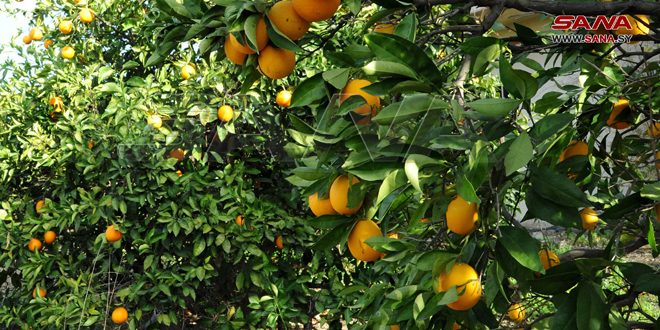The Citrus Office of the Ministry of Agriculture has estimated citrus production for the 2022-2023 season at 641 thousand tons, a decrease of 16.3 percent compared to last year, which amounted to 760 thousand tons.
The director of the citrus office in the Ministry, Eng. Nashwan Barakat, said that the climatic conditions of high temperatures and storms caused a decline in citrus production for this season, pointing out that citrus production is distributed among 4 main groups, including oranges, which constitute 55 percent of production, tangerines, 25 percent, sour, 14 percent, and the grapefruit group constitutes 6 percent of production.
Barakat indicated that the estimates of citrus production for this season amounted to about 641,000 tons, including 487 thousand tons in Lattakia and 154 thousand tons in Tartous, explaining that the unsuitable climatic conditions greatly affected a number of varieties, especially the “Abu Surra and Al-Hamid Mayer” varieties, and a number of citrus orchards were exposed to varying damages, such as fruit falling and complete uprooting in the storm conditions that hit the Syrian coast.
Barakat pointed out that the high costs of production requirements also led to poor production for a large number of farmers, noting that as a result of the relatively light load, the quality of the product is good, especially in farms irrigated by government irrigation projects, which have been adequately served.
Barakat indicated that the results of the analysis of the fruits carried out in the citrus office for the “myer acid” variety showed that the percentage of juice in them is still low and ranges between 30 and 32 percent in one third of the collected samples, which calls for waiting in the picking operations for at least another 15 days.
Engineer Barakat called citrus growers to monitor the spread of the disease “Rust nipples” on citrus, grapefruit and pomelo varieties, since the current weather conditions of high humidity and high temperature contribute to the spread of this pest, and to review technicians in the citrus office or citrus engineers in the extension units to examine samples when there are any injuries so that the appropriate action is taken.
The director of the citrus office in the Ministry, Eng. Nashwan Barakat, said that the climatic conditions of high temperatures and storms caused a decline in citrus production for this season, pointing out that citrus production is distributed among 4 main groups, including oranges, which constitute 55 percent of production, tangerines, 25 percent, sour, 14 percent, and the grapefruit group constitutes 6 percent of production.
Barakat indicated that the estimates of citrus production for this season amounted to about 641,000 tons, including 487 thousand tons in Lattakia and 154 thousand tons in Tartous, explaining that the unsuitable climatic conditions greatly affected a number of varieties, especially the “Abu Surra and Al-Hamid Mayer” varieties, and a number of citrus orchards were exposed to varying damages, such as fruit falling and complete uprooting in the storm conditions that hit the Syrian coast.
Barakat pointed out that the high costs of production requirements also led to poor production for a large number of farmers, noting that as a result of the relatively light load, the quality of the product is good, especially in farms irrigated by government irrigation projects, which have been adequately served.
Barakat indicated that the results of the analysis of the fruits carried out in the citrus office for the “myer acid” variety showed that the percentage of juice in them is still low and ranges between 30 and 32 percent in one third of the collected samples, which calls for waiting in the picking operations for at least another 15 days.
Engineer Barakat called citrus growers to monitor the spread of the disease “Rust nipples” on citrus, grapefruit and pomelo varieties, since the current weather conditions of high humidity and high temperature contribute to the spread of this pest, and to review technicians in the citrus office or citrus engineers in the extension units to examine samples when there are any injuries so that the appropriate action is taken.
NR
|
|

